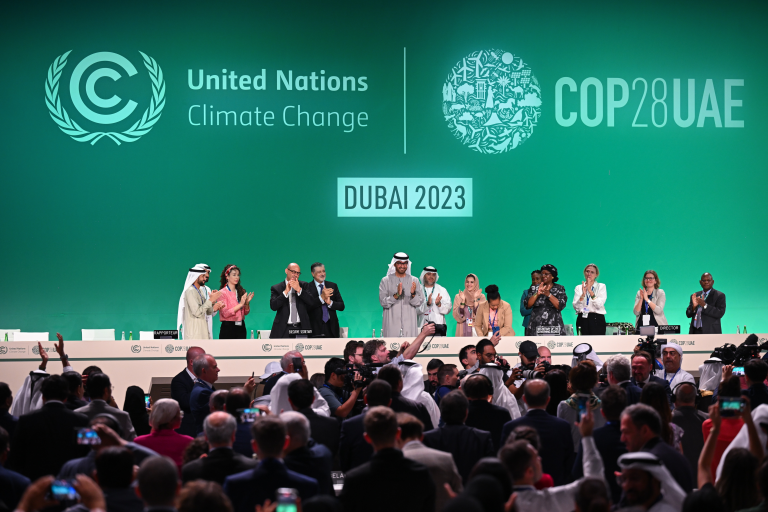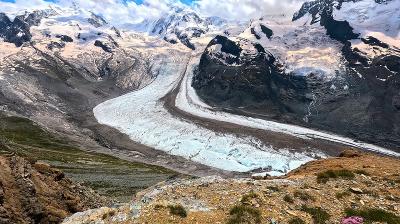COP28 concludes with historic agreement to try to tackle the climate crisis

The United Nations Climate Change conference, COP28, has concluded with a historic agreement to transition away from fossil fuels, triple renewable energy and increase climate finance for the most vulnerable. It aims to keep alive the goal of the Paris Agreement to try to limit long-term global average near-surface temperature to 1.5°C above the pre-industrial era.
The agreement – whilst less ambitious than many had hoped – calls for more decisive climate action in the face of rapidly accelerating climate change and more dangerous extreme weather that is leading to massive environmental, economic and societal upheaval.
“Together, we have confronted realities and we have set the world in the right direction. We have given it a robust action plan to keep 1.5°C within reach. It is a plan that is led by the science,” announced COP28 President Dr Sultan Al-Jaber at the end of the two-week conference in Dubai, United Arab Emirates.
“It is a balanced plan that tackles emissions, bridges the gap on adaptation, reimagines global finance, and delivers on loss and damage. It is an enhanced, balanced, but… make no mistake… historic package to accelerate climate action. It is…the UAE Consensus,” declared the COP28 President.

World Meteorological Organization Secretary-General Prof. Petteri Taalas welcomed the fact that the COP28 declaration recognizes the science, and the urgency of tackling the climate crisis. It reflects substantial input provided by WMO on monitoring the climate and climate-related extremes, climate mitigation and adaptation, including the priority of protecting everyone on Earth through universal coverage of early warning systems against extreme weather and climate change by 2027.
“The agreement at COP28 in Dubai is historic in that – for the first time – it recognizes the need to transition away from fossil fuels for the first time. This is an important step in the right direction but not the final goal. We urgently need to reduce our production and consumption of fossil fuels and speed up the transition to renewables. Time is running out,” said Prof. Taalas.
“WMO reports presented to COP28 highlighted the accelerating pace of climate change and its impacts on our planet and – through more extreme weather – on our daily lives. 2023 is virtually certain to be the warmest year on record, already about 1.4°C above the pre-industrial era when COP28 started in November. 2024 is expected to continue to be warm, perhaps even hotter. It is imperative that we stay below the 1.5°C lower temperature limit of the Paris Agreement and we are getting perilously close,” he said.
“Carbon dioxide concentrations in the atmosphere keep reaching record levels year-on-year, meaning that temperatures will continue to rise in the coming decades, given the long lifetime of CO2. And we are losing the race to limit the shocking decline in our vital glaciers and to limit sea level rise,” said Prof. Taalas.
The WMO community is committed to strengthening resilience by continuing to provide essential knowledge about our changing climate and through the Early Warnings for All initiative, he said.
WMO is also committed to providing the best possible science and services to inform mitigation action in the crucial years ahead, including strengthening the global climate observing network, including through a new Global Greenhouse Gas Watch initiative.
The science community has demonstrated that there is a need to use kilometer resolution climate models in order to better simulate extreme weather events and the speed of Antarctic glacier melting in an improved manner. Further planning with the government of the UAE was agreed in Dubai, said Prof. Taalas.
The beginning of the end of fossil fuels
The overwhelming welcome given to the COP28 agreement was tempered by concern, especially from Small Island Developing States, that it is too little too late. But the applause as the final gavel came down reflected the widespread relief that consensus and compromise had been reached.
COP28 made sizable strides, including through a new framework for the Global Goal on Adaptation and operationalization of the loss and damage fund with an initial down payment. The final declaration includes a global goal to triple renewables and double energy efficiency.
The text also recognizes the importance of:
- Significantly reducing climate-induced water scarcity and enhancing climate resilience to water-related hazards towards a climate-resilient water supply, climate-resilient sanitation and access to safe and affordable potable water for all.
- Attaining climate resilient food and agricultural production and supply and distribution of food.
- Attaining resilience against climate related health impacts, promoting climate resilient health services and significantly reducing climate related morbidity and mortality.
UN Secretary-General António Guterres urged rapid implementation of the declaration into action on the ground.
“Science tells us that limiting global heating to 1.5°C will be impossible without the phase out of fossil fuels. This was also recognized by a growing and diverse coalition of countries at COP28. The era of fossil fuels must end – and it must end with justice and equity,” he said.
“Whilst we didn’t turn the page on the fossil fuel era in Dubai, this outcome is the beginning of the end,” said UN Climate Change Executive Secretary Simon Stiell. He said the actions agreed are a “climate-action lifeline, not a finish line.”










